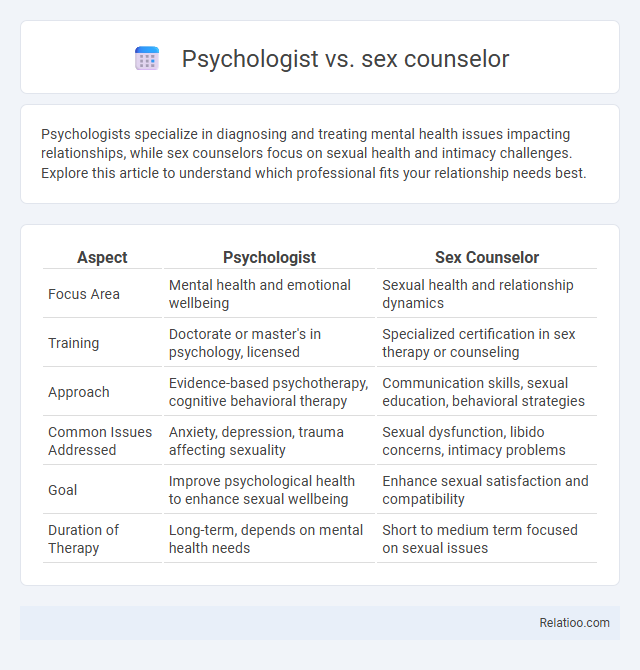Psychologists specialize in diagnosing and treating mental health issues impacting relationships, while sex counselors focus on sexual health and intimacy challenges. Explore this article to understand which professional fits your relationship needs best.
Table of Comparison
| Aspect | Psychologist | Sex Counselor |
|---|---|---|
| Focus Area | Mental health and emotional wellbeing | Sexual health and relationship dynamics |
| Training | Doctorate or master's in psychology, licensed | Specialized certification in sex therapy or counseling |
| Approach | Evidence-based psychotherapy, cognitive behavioral therapy | Communication skills, sexual education, behavioral strategies |
| Common Issues Addressed | Anxiety, depression, trauma affecting sexuality | Sexual dysfunction, libido concerns, intimacy problems |
| Goal | Improve psychological health to enhance sexual wellbeing | Enhance sexual satisfaction and compatibility |
| Duration of Therapy | Long-term, depends on mental health needs | Short to medium term focused on sexual issues |
Understanding the Roles: Psychologist vs Sex Counselor
Psychologists specialize in diagnosing and treating mental health disorders using evidence-based therapies, often addressing deeper emotional and cognitive issues influencing sexual well-being. Sex counselors focus specifically on sexual concerns and relationship dynamics, providing guidance and support to improve sexual function and intimacy through practical advice and psychoeducation. Understanding the distinction between a psychologist and a sex counselor helps clients choose appropriate care, as psychologists handle broader psychological challenges while sex counselors target sexual health and relationship satisfaction.
Educational Background and Training Requirements
Psychologists typically hold a doctoral degree (PhD or PsyD) in psychology and complete extensive training in mental health assessment, diagnosis, and therapeutic techniques. Sex counselors often have specialized certification or a master's degree in counseling, psychology, or social work, emphasizing human sexuality and sexual health rather than broad mental health issues. Sex therapists require advanced training and credentials such as certification from the American Association of Sexuality Educators, Counselors, and Therapists (AASECT), focusing on clinical interventions for sexual dysfunction and relationship issues.
Areas of Expertise and Specialization
Psychologists specialize in mental health disorders, emotional well-being, and behavioral therapy, often addressing underlying psychological issues such as anxiety, depression, and trauma. Sex counselors focus on sexual health concerns, including relationship dynamics, sexual dysfunction, intimacy challenges, and communication about sexual desires, providing practical advice and support without medical interventions. While psychologists may incorporate sex therapy as part of broader mental health treatment, sex counselors primarily emphasize sexual education, behavioral strategies, and improving sexual satisfaction and function.
Approaches to Therapy and Counseling
Psychologists employ evidence-based psychological assessments and therapies, such as cognitive-behavioral therapy (CBT), to address underlying mental health issues affecting sexual function and relationships. Sex counselors focus on educational guidance and communication strategies, often using cognitive and behavioral techniques to resolve sexual concerns without deep psychological diagnosis. Sex therapists integrate a combination of clinical psychotherapy and sexology expertise, addressing both emotional and physical aspects of sexuality through specialized interventions tailored to individual or couple needs.
Common Issues Addressed by Each Professional
Psychologists typically address underlying mental health conditions such as anxiety, depression, and trauma that affect sexual well-being, often exploring emotional and cognitive patterns. Sex counselors focus on specific sexual concerns like performance anxiety, communication difficulties, and relationship issues related to intimacy without necessarily diagnosing mental health disorders. Sex therapists combine techniques from both fields to treat complex sexual dysfunctions, incorporating psychological and physical factors to improve sexual health and satisfaction.
Confidentiality and Ethics in Practice
Psychologists adhere to strict confidentiality and ethical guidelines set by professional organizations like the APA, ensuring your sensitive information is protected while providing comprehensive mental health support. Sex counselors, often certified specialists, also maintain confidentiality but may follow different ethical standards depending on their certification bodies and scope of practice. Understanding these distinctions helps you choose a professional who best aligns with your privacy expectations and therapeutic goals in addressing sexual health concerns.
When to See a Psychologist vs a Sex Counselor
You should see a psychologist when experiencing deep-rooted emotional or mental health issues affecting overall well-being, such as depression or anxiety, that may indirectly impact your sex life. A sex counselor specializes in addressing specific sexual concerns like libido, performance anxiety, or sexual dysfunction, providing targeted strategies and education. Understanding the distinction helps you seek expert guidance tailored exactly to your psychological or sexual health needs.
Collaboration and Overlapping Services
Psychologists and sex counselors often collaborate to address complex sexual health issues by combining therapeutic techniques with specialized sexual counseling expertise. Sex counselors focus primarily on sexual concerns, offering targeted interventions, while psychologists provide broader mental health support that can include sexual dysfunction and relationship problems. Your treatment benefits from this overlapping service model, ensuring comprehensive care through integrated approaches.
Finding the Right Professional for Your Needs
Selecting the right professional for sexual health concerns depends on your specific needs, goals, and the type of support required. Psychologists provide comprehensive mental health evaluations and therapeutic interventions addressing underlying psychological issues, while sex counselors specialize in guiding clients through sexual concerns and relationship dynamics with practical advice and education. For targeted sexual dysfunctions or intimacy challenges, consulting a certified sex counselor ensures expert assistance tailored to improving sexual well-being and communication skills.
Conclusion: Making an Informed Choice
Choosing between a psychologist, a sex counselor, or a sex therapist depends on your specific needs and goals for therapy. A psychologist offers broad mental health expertise including diagnosis and treatment of psychological disorders, while a sex counselor provides guidance on sexual issues with a focus on communication and education, and a sex therapist combines psychological techniques with specialized training in sexual health. You should evaluate your personal concerns, desired outcomes, and the professional qualifications to make an informed choice tailored to your well-being.

Infographic: Psychologist vs sex counselor
 relatioo.com
relatioo.com